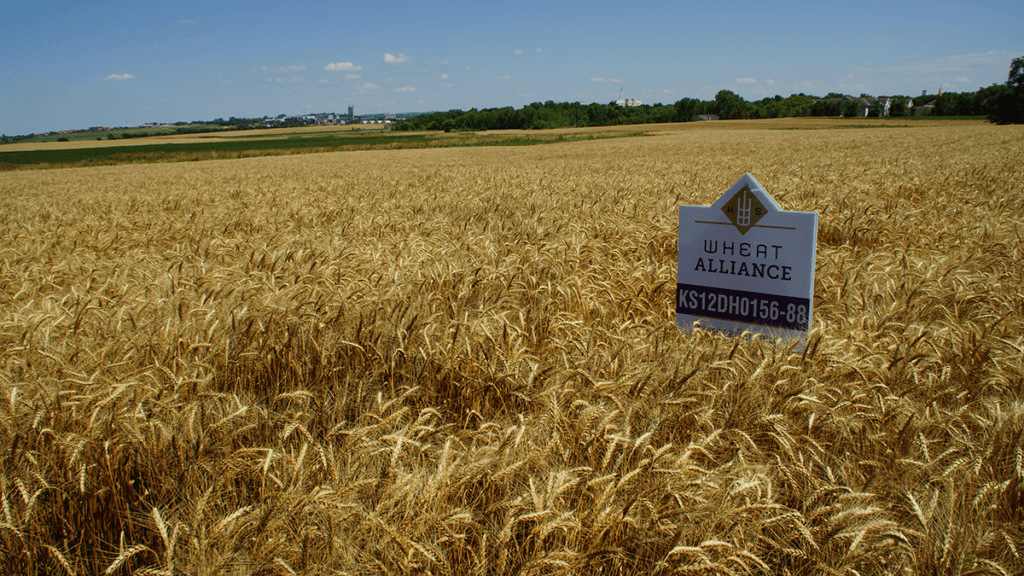A little more than 100 years ago, wheat breeding was in its infancy. Individuals were selecting some plants out of landrace populations that they thought looked superior and then reproducing the seed. A few trained botanists at government agencies or universities were experimenting with cross pollination to capture desirable traits like disease resistance into new varieties. Kanred, released by K-State in 1918, was one of the first such varieties.
While other crop varieties also got their start at public institutions, private companies soon dominated the hybrid corn and sorghum seed businesses by the middle of the century and the soybean seed business by the 1980s. Although private seed companies have had some interest in wheat over the years, publicly developed varieties continued to be the most popular.
In the last ten years, however, private companies have made significant investments in their wheat breeding programs and farmers now have more choices of varieties than ever before. Maybe too many choices, some would say.
With many of the most widely grown varieties being marketed by private companies, is there still a need for public wheat breeding programs?
“Zenda, Bob Dole, Joe and Everest are K-State releases; SY Monument and WB Grainfield are both 50% K-State experimentals; Winterhawk is a direct selection from a KSU population; and, the original cross for LCS Chrome was made by K-State breeders, so the KSU program has a pretty strong influence on eight of the top ten planted varieties.”
Allan Fritz, Kansas State University Wheat Breeder in Manhattan, Kan.
In fact, more than half of the wheat acres planted in Kansas have at least some genetics derived from K-State breeding efforts.
But it’s more than just genetics.
“Over 80% of the wheat varieties grown in the U.S. have some tie back to K-State, either in the genetics they use, or the breeder or technicians were trained at K-State.”
Rollie Sears, retired K-State and AgriPro wheat breeder
K-State wheat breeding has a strong influence on the varieties grown throughout the Great Plains.
In his program, Guorong Zhang, K-State Wheat Breeder in Hays, Kan., says he’s not just concentrating on yield, like many of the private companies do. He’s also breeding for disease resistance, drought tolerance and quality improvements. Additionally, he’s looking for unique characteristics that may add value to identity preserved markets, such as white wheat, waxy wheat, low PPO and partially waxy wheat for noodle production, and high protein wheat.
Fritz is also broadening his research to discover varieties best suited to organic farming; identify a high-protein, spring quality-like winter wheat; develop durum suited for the High Plains; and use wild wheat relatives for novel disease and quality characteristics.
In contrast, none of the private companies engage directly in training wheat breeders or conduct basic research on wheat genetics. Few, if any, are doing significant research on adding value or specialty uses for wheat. These areas are left to the public institutions, and K-State breeders are focused on these areas.
K-State’s wheat breeding programs are valuable because they have the best genetics that are often used by other breeding programs; K-State has one of the few programs training the next generation of wheat breeders; K-State is doing basic research within the Wheat Genetics Resource Center as well as in the breeding programs and then making this work widely available.
Research programs are expensive and that’s why they are left in large part to universities and government agencies. It’s no secret that state and federal funding for research and universities has been on the decline. All university wheat breeding programs are now dependent on some royalty income, not to just stay competitive, but to continue to advance for the common good.
Competition is good for everyone. Public breeding programs need your support if they are going to continue. Buying Certified seed supports the development of new varieties. Choosing to buy K-State wheat varieties supports variety development, basic research, training future breeders and keeps competition in the marketplace. The next time you buy wheat seed, please consider a K-State variety, and please consider the investment you are making in your future when you buy Certified seed to plant on all your acres.

